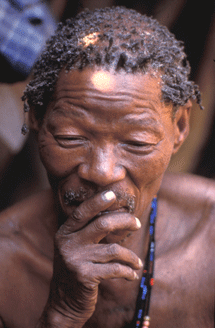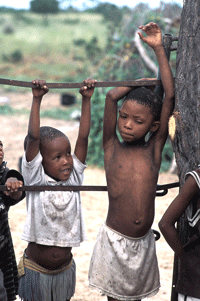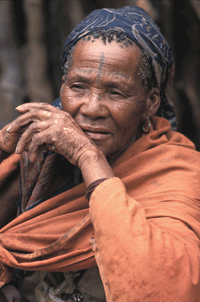Tensions High for the Kalahari Bushmen
Air Date: Week of October 14, 2005

This Bushman man lives on the tribal homeland inside the Central Kalahari Game Reserve in Botswana.(© Survival)
The Bushmen of the Central Kalahari Game Reserve in Botswana are fighting to remain on their ancestral land and continue their traditional way of life. Rupert Isaacson, author of “The Healing Land: The Bushmen and the Kalahari Desert,” tells Living on Earth host Steve Curwood that the government is stepping up its efforts to relocate the Bushmen because of an impending court case challenging the so-called “forced removals.” We’ll also hear from John Moreti, deputy ambassador of the Embassy of the Republic of Botswana, who says the Bushmen were never forcibly relocated.
Transcript
CURWOOD: It's Living on Earth. I'm Steve Curwood. In the 1960s, just before the African nation of Botswana was about to achieve independence from Britain, the colonial government took an unusual step. It set aside a remote area called the Central Kalahari Game Reserve to allow the indigenous Bushmen to continue their traditional hunting and gathering lifestyle. The Bushmen of Kalahari are thought to be the world's oldest aboriginal tribe, with a culture that dates back tens of thousands of years.

This Bushman man lives on the tribal homeland inside the Central Kalahari Game Reserve in Botswana. (© Survival)
ISAACSON: Well, the government will tell you there’s about 17, and they’ve been keeping to this figure for the last three years. In fact, there’s a fluctuating population of between 230 and 260. It’s families living around three confluences of underground rivers where there’s sufficient biodiversity in the wild plants that can produce, you know, wild foods that even without being allowed to hunt they can basically hang on.
But the problem for them is several fold. In the dry season, like right now, when nothing is growing, there’s one source of water in the whole Kalahari, and that is a thing called the tsamma melon. And it grows above ground on these runners and it’s a miracle of this dry land, arid place. So that’s how they’ve been surviving.
Unfortunately now, in the new government push to get them out, there are armed personnel units of anti-poaching wildlife police, and something more sinister called the SSG, which is the Special Support Group, it’s the paramilitary wing of the police, it’s like the SWAT team here. They’re camped out next to these villages now. And if people go into the bush trying to gather, they get hassled and intimidated. The melon patches that they’d grown have been destroyed. Their radios have been taken away.

Bushman children of the Central Kalahari Game Reserve. (© Survival)
CURWOOD: Last year on our program, you talked about a court case that the First People, the Kalahari, have brought against the Botswana government. The Bushmen are charging that the relocation of them off the reserve was illegal. Where does that case stand now?
ISAACSON: Right. The case is currently adjourned till February while Bushmen, as usual, run out of money, as the government spins the case out over the years. They’re now having to go and try and get donors to give them more money to see the court case through its next session. What seems to be different this time, as opposed to any other time the case has come to court in the last three years, is that the three judges in the case appear to be getting impatient for a verdict. They appear to be worried that this obvious bankrupting of the Bushmen by the government lawyers; this obvious stalling in order to bankrupt them by the government is starting to make a mockery of the Botswana judicial system. The government, reacting in alarm to this, decided to up the brutality to try and push the people out. So over the course of the summer the incidences of violence and brutality have gone way up.
CURWOOD: Briefly, what is in this case? What exactly is the case that’s been brought?
ISAACSON: Well, all the Bushmen want is their existing rights to dwell, hunt, gather, keep a small number of livestock, and raise small melon patches – melons are how you get water in the dry season – those are the rights they were given when the reserve was declared. All they’re asking for is for those to be upheld.
They’re not asking for mineral rights, even though all the land they were kicked off of has been given over diamond mining companies for exploration, companies like De Beers and BHP Billiton. They’re not asking for anything more than what they originally had.

Bushman woman from the Central Kalahari Game Reserve. (© Survival)
CURWOOD: Now, the government of Botswana says that they never have forcefully removed Bushmen from the reserve, that they’ve negotiated with them over a long period of time, more than a dozen years. They say to resettle outside the reserve so they can, quote, “enjoy the benefits of development.” Why do you believe the government wants to remove the Bushmen out of the Kalahari Reserve?
ISAACSON: Well, it was a complicated history. There are a number of things that come in. Diamonds are a part of it. An idea about humans and wild animals not being able to coexist is part of it. And ideas about development having to look a certain way. These three things are combined into an unholy cocktail.
So the government line, as you say, is we never kicked these people out. They moved voluntarily, they were all compensated handsomely. We’ve given them schools, we’ve given them clinics, etc., etc. And there’s enough half and quarter-truths in this to render the Botswana government’s propaganda machine quite effective.
When they moved the first round of people out in ’96, some of those people were compensated, and some of them were not. Not by a whole lot. And some of them were given livestock and some of them were not. Most of them did not want to move. They said repeatedly that they didn’t want to move. They moved fairly fatalistically when the trucks showed up to pick them up, because their bore hole that they’d been getting their water from was cut off to them.
Then there was a big human rights outcry about this. Immediately, these people were moved, they were moved to an area that had been grazed out about ten years before the Bushmen were moved there. So there’s no way to make a living off that land. You can’t hunt it, you can’t gather anything, there’s no wild food. You certainly can’t farm it.
So immediately they were place on what are called “destitute rations” – government destitute rations – so they were turned from people who were living a very self-sufficient life to people who were now reduced to waiting for government to give them a certain amount of flour every month and a bit of money, about fifteen U.S. dollars, which promptly gets spent on alcohol. When people are in that kind of despair the alcohol rates spike. People come in from the outside towns, they start selling alcohol there. They couldn’t get into the reserve and sell alcohol before that. It was too remote.
CURWOOD: Rupert Isaacson is the author of “The Healing Land: The Bushmen and the Kalahari Desert.” In November, the African Commission on Human Rights will hear arguments on whether the Botswanan government is causing the Bushmen ongoing, irreparable harm and blocking their attempts to find redress in the fight over their ancestral land.
But John Moreti, deputy ambassador of the Republic of Botswana in Washington, D.C., says since the 1960s there has been diamond exploration all over Botswana, including in the Kalahari Game Reserve, and that the Bushmen have not been asked to leave to make way for mining.
Mr. Moreti says while the government prefers the Bushmen to live outside the park in order to benefit from the quote "fruits of development,” it has never forced the Bushmen, whom he calls “the Basarwa,” to relocate.
MORETI: It took twelve years for the government to consult with the Basarwa about the proposed moves from the Central Kalahari Game Reserve. That can never be forced removals. If you want to force somebody to move out of an area, you don’t take twelve years negotiating and putting in place arrangements that would make them relocate easily.
CURWOOD: Mr. Moreti says the Bushmen are welcome to stay in the Reserve, as long as they don’t violate any government regulations. He denies his government has beaten or used force against the Bushmen. As for the purported conditions in the resettlement areas:
MORETI: You know, interestingly, some of the people who tell these stories have never even been to those areas. The people who go to these areas to witness firsthand the development on the ground and talk to the people’s feelings about what the government has done for them reveal something completely different.
CURWOOD: John Moreti is deputy ambassador of the Republic of Botswana in Washington, D.C.
Links
Living on Earth wants to hear from you!
Living on Earth
62 Calef Highway, Suite 212
Lee, NH 03861
Telephone: 617-287-4121
E-mail: comments@loe.org
Newsletter [Click here]
Donate to Living on Earth!
Living on Earth is an independent media program and relies entirely on contributions from listeners and institutions supporting public service. Please donate now to preserve an independent environmental voice.
NewsletterLiving on Earth offers a weekly delivery of the show's rundown to your mailbox. Sign up for our newsletter today!
 Sailors For The Sea: Be the change you want to sea.
Sailors For The Sea: Be the change you want to sea.
 The Grantham Foundation for the Protection of the Environment: Committed to protecting and improving the health of the global environment.
The Grantham Foundation for the Protection of the Environment: Committed to protecting and improving the health of the global environment.
 Contribute to Living on Earth and receive, as our gift to you, an archival print of one of Mark Seth Lender's extraordinary wildlife photographs. Follow the link to see Mark's current collection of photographs.
Contribute to Living on Earth and receive, as our gift to you, an archival print of one of Mark Seth Lender's extraordinary wildlife photographs. Follow the link to see Mark's current collection of photographs.
 Buy a signed copy of Mark Seth Lender's book Smeagull the Seagull & support Living on Earth
Buy a signed copy of Mark Seth Lender's book Smeagull the Seagull & support Living on Earth

